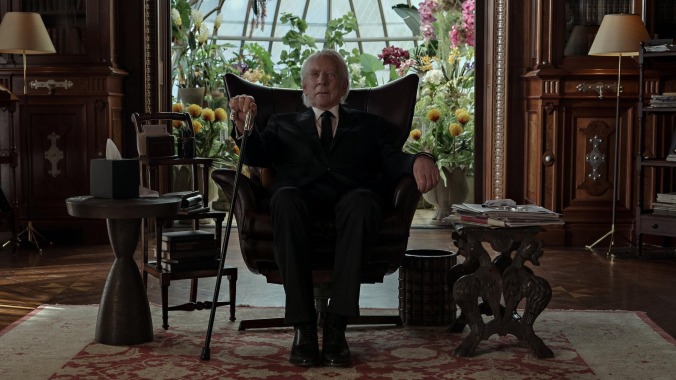Even Stephen King fans may feel Mr. Harrigan’s Phone isn't worth picking up
Dial “B” for boring in this lackluster Netflix film about a teen with a haunting connection to Donald Sutherland's aging tycoon

More akin to a stern lecture by a grownup than an eerie, unsettling cautionary tale, writer-director John Lee Hancock’s adaptation of Stephen King’s short story Mr. Harrigan’s Phone might have succeeded better if it didn’t completely collapse into boomer-style commentary about how modern technology is terrible and will inevitably lead to humankind’s downfall. Though its narrative contains some subtleties, and Hancock’s aesthetic polish gives it a nice gloss, the picture’s pacing and character-driven momentum frequently sputters, ultimately leading to diminished results.
Sullen, painfully shy young Craig (Colin O’Brien) is suffering from grief over the death of his mother when he’s recruited by his tiny town’s wealthiest citizen, John Harrigan (Donald Sutherland), to read books to him three times a week. The elderly billionaire businessman—one with a reputation for ruthlessness—is losing his eyesight and, though he won’t admit it, desperate for companionship. Though Craig’s unsure why he’s been selected for the gig, his father (Joe Tippett) believes visiting Mr. Harrigan’s gothic mansion will do him good. And magically, it does.
As the years fly by, Craig (now played by Jaeden Martell) matures into a better and more sophisticated reader, able to analyze the masterpieces he’s read to Mr. Harrigan, who has also come out of his shell as a result of their interactions. Now a high school freshman, Craig’s aspirations to fit in with the popular crowd drive him to take part in the early aughts’ smartphone revolution. He drags his elderly boss into it too, setting him up with a customized phone. Yet when Mr. Harrigan suddenly dies, strange things begin happening with their cell phones—one of which is interred with the corpse.
Almost immediately, the film teases a better, craftier hook into the story than the one it pursues, involving elements like Craig’s winning lotto ticket and a jagged quarry filled with murky water. Even high school bully Kenny (Cyrus Arnold) is underdeveloped as the catalyst for Craig’s initial change: he’s conceived more as a broad caricature than an imposing, intimidating force, and consequently so difficult to take seriously that he interrupts the film’s otherwise sinister tone.

 Keep scrolling for more great stories from A.V. Club.
Keep scrolling for more great stories from A.V. Club.